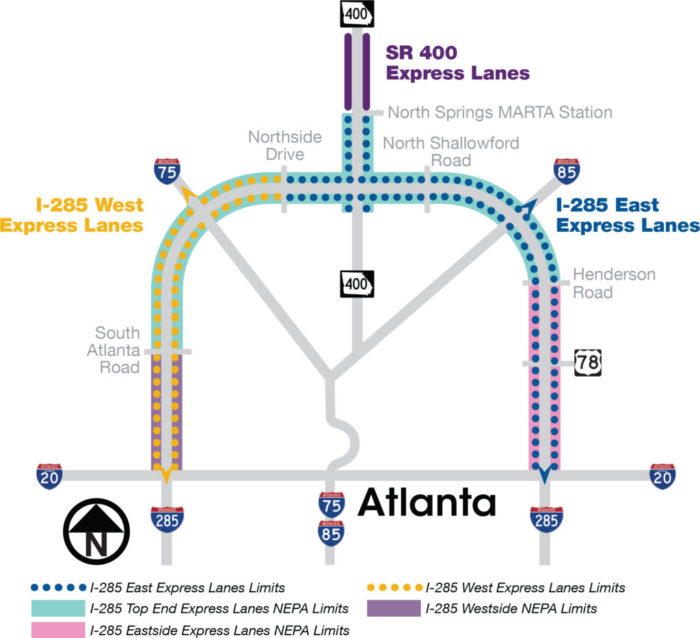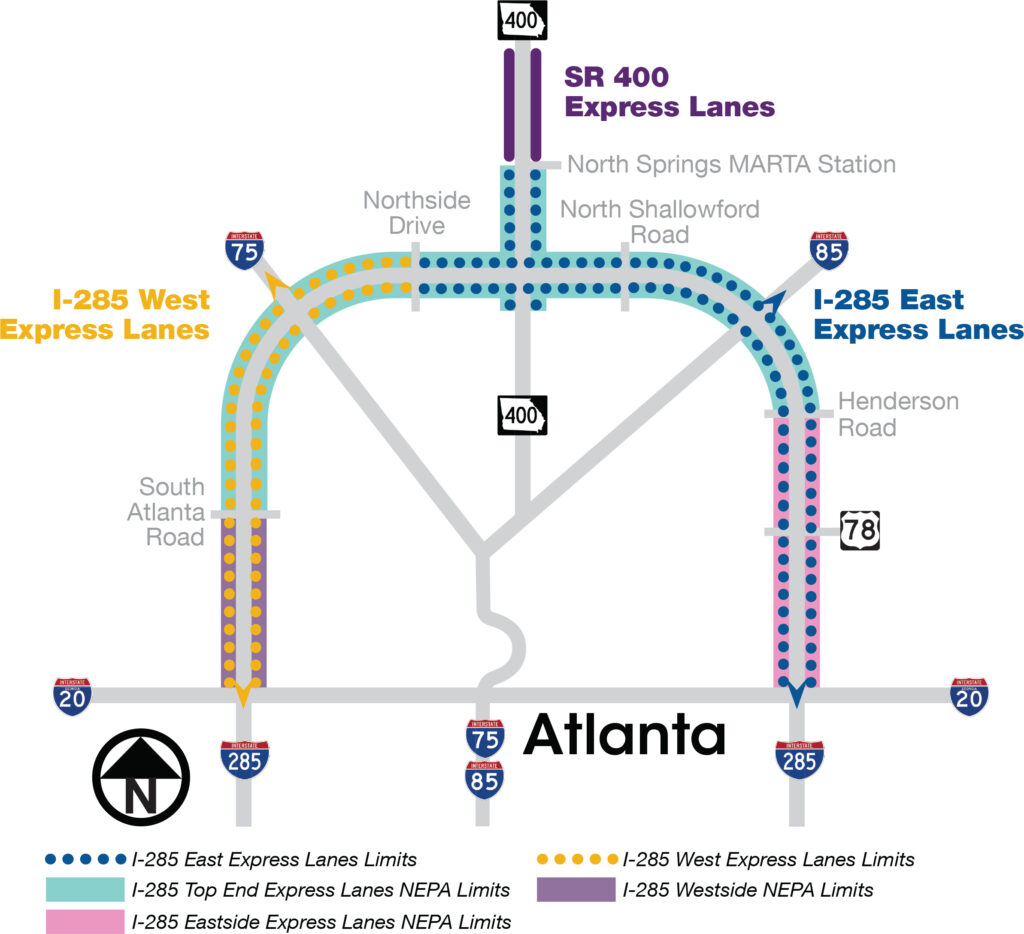The Georgia Department of Transportation (GDOT) has selected SR400 Peach Partners as the preferred bidder for the massive SR400 Express Lanes project. The project will develop barrier-separated express lanes along the majority of a 16-mile stretch of SR400 north of Atlanta, and operate the system under a 55-year revenue-risk concession. The procurement is the first express lanes P3 under GDOT’s Major Mobility Investment Program (MMIP), which will eventually develop a massive pipeline of express lanes projects on SR400 and I-285 on the north side of Atlanta.
The results of the procurement will likely turn some heads. The winning proposal from SR400 Peach Partners includes $4.6 billion in design and construction costs, plus a concession payment of $4.05 billion, payable to the state at financial close.

SR400 Peach Partners is led by Meridiam, ACS Infrastructure, and Acciona Concesiones, with lead construction contractors Acciona and Dragados. Parsons is the lead engineering firm for the team, and Indra USA is onboard as the Toll System Integrator Contractor.
The project timeline in the SR400 Peach Partners proposal includes 12 months of early work to financial close, followed by a 66-month development period. Major construction activities would begin in mid-2026 and be completed in early 2031. The design-build team plans to complete nearly 50% of construction offline in order to minimize traffic disruptions.
Competition and Innovation
Competition for the SR400 project was expected to be stiff, given the size of GDOT’s project portfolio. GDOT created some incentives for innovation by allowing bid teams to propose Alternative Technical Concepts (ATCs) during the procurement process. These ATCs consist of changes to project designs or scope to either improve connectivity or reduce project costs.
GDOT got a lot of them. The SR400 Peach Partners proposal included 15 ATCs for improved connectivity, which either improve the flow of traffic in the express lanes or allow more drivers to access them. It also included another 19 approved ATCs to improve construction and value engineering.
The approach generated different solutions to meet GDOT’s objectives. GDOT also received a complete proposal from Georgia Express Link Partners for the project, which was a team led by Cintra and Tikehau Star Infra, with Ferrovial Construction as the lead design-build contractor.
“Given the potential alternatives and different configurations that teams consider, teams develop different solutions through the competitive process to maximize value” said Nicolas Rubio, Chief Executive Office North America for Meridiam. “By the end we are really comparing different products.”
Nuria Haltiwanger, Chief Executive Officer of ACS Infrastructure said that the procurement results “shows the highly competitive nature of these deals. In addition, the success of this procurement seems to have raised interest across the industry with a feeling that ‘GDOT did this right’ – which bodes well for future procurements.“

First Out of Three
The SR400 procurement is just the first of three different express lanes concessions on SR400 and I-285 north of Atlanta. All three of the concessions will need to be integrated to deliver what will eventually be a massive network, and project pipeline. GDOT is collaborating with the State Road and Tollway Authority (SRTA) to deliver and procure the SR400 and I-285 express lane projects. The second procurement, for the I-285 East concession, is about to begin qualifications.
The system is so large that breaking it up into multiple concessions and procurements was inevitable, but GDOT structured the concessions in a way that both requires the concessions to integrate and still ensures competition for those future procurements.
“These procurements really are set up so they can stand on their own,” said Tim Matthews, Assistant P3 Division Director at GDOT. “That way we can really maximize competition in the long run.”
Competition will likely remain heavy for the next phase. “There will certainly need to be integration between the segments, but these concessions are very well structured to facilitate that integration between concessions,” said Rubio. “An incumbent may have some synergies on O&M, but those are small and won’t be enough to deter competition.”
Industry Capacity
During the procurement process, GDOT officials expressed concerns over whether there necessarily would be enough capacity in the industry to absorb all of the development work they had planned over the next decade, especially when added to the other express lane projects that other states are planning in the coming years (see this edition).
Rubio and Haltiwanger said that the industry would very likely be able to meet demand, at least on the investment side. “There is a large pipeline of work developing in this sector, and not just in Georgia,” said Rubio. “However, I think that the industry has the capacity to meet the need. In fact, competition within the sector is likely to grow in my view.”
“The larger capacity constraint is often around the size of the projects from a construction perspective, to ensure that the prime contractors will have the relevant bonding capacity and size,” said Haltiwanger.
Second Time’s the Charm
The successful SR400 project is also a bit of a recovery for GDOT. In 2021, the Georgia Transportation Board voted to cancel the procurement of an earlier version of the SR-400 Express Lanes P3. That earlier version of the project was a DBFM concession, which would have been funded via availability payments, with GDOT retaining revenue risk for the express lanes. At the time, proposals for the project reportedly exceeded the state’s allocated funding for the project, and it was cancelled very late in the procurement process.
In fact, the three shortlisted bidders for that procurement included Meridiam, ACS, and Acciona.
The SR400 procurement was a turnaround, and GDOT officials communicated with industry throughout the process that they wanted to take innovative approaches to sharing or mitigating project risks. “We changed how we approached these procurements in terms of the project risk profile and who owns it,” said Matthews. “Georgia DOT can address some of those risks with risk sharing, and others we’re addressing by taking care of them up front, like most of the utility work and right-of-way.”
“They took the opportunity to step back, listen to industry concerns, re-evaluate their overall goals for the project and the program, and created something that is now the market standard for these kinds of procurements,” said Haltiwanger.

Moving On To I-285
GDOT barely stopped to celebrate the procurement milestone. Just a few weeks after the selection for SR400, GDOT held and industry forum to kick off the next major Atlanta Express Lanes project: I-285 East.
The I-285 East express lanes will tie into the SR400 express lanes north of Atlanta, and then develop two barrier-separated express lanes east and south along I-285 to I-20. Unlike the SR400 project, the I-285 East procurement will result in both a concession for an initial segment of the express lanes, as well as a Comprehensive Development Agreement under which the winning bidder will be able to complete predevelopment and potential deliver future extensions.
GDOT has now delineated that initial “hard bid” segment of the I-285 East project. It will run from Northside Drive north of Atlanta to Henderson Road, and will include the interconnection with the SR400 express lanes. However, that initial phase will only be for the westbound set of express lanes along that segment. The eastbound set of lanes will be developed during a future phase.
The I-285 West P3, which will be procured last, will similarly develop express lanes on the I-285 perimeter from the I-285 East segment to the intersection with I-20 on the west side of Atlanta. GDOT currently plans to start the I-285 West procurement in the second quarter of 2025.
At the industry forum, GDOT presented on the scale of congestion relief needed on the I-285 perimeter. Once all phases of both concessions are completed, the I-285 express lanes will cover the 5th, 6th, 9th, 12th, and 21st worst traffic bottlenecks in the United States.
GDOT is completing three different Environmental Impact Statements (EISs) for all of the express lanes on the perimeter. It completed a Draft EIS covering a large segment of I-285 earlier this summer. That study would cover the segment in the first phase of the I-285 East P3 to Henderson Road, and GDOT plans on completing the environmental study in fall 2025. GDOT is currently working on Draft EIS’s for the rest of the I-285 East P3 and part of the I-285 West P3.
GDOT is planning to issue an RFQ for the I-285 East P3 in September, and to shortlist firms early next year.
GDOT and SRTA are working with a number of advisors to plan and procure the I-285 express lanes. HNTB is onboard as their Program Management Consultant. Jacobs is their General Engineering Consultant. Ernst & Young is the Financial Advisor. Ashurst, McGuireWoods and Nossaman are all onboard as legal advisors. AtkinsRéalis is the tolling advisor. Ames & Gough is their insurance advisor, and C&M Associates is the traffic and revenue advisor.



